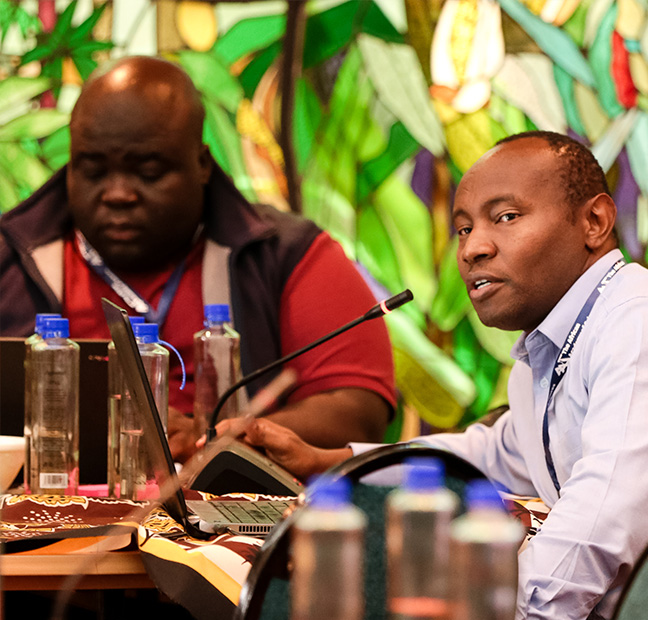AESA PROGRAMMES
- Building R&D Infrastructure
- Developing Excellence in Leadership, Training and Science in Africa (DELTAS Africa)
- Human Heredity and Health in Africa (H3Africa)
- Africa’s Scientific Priorities (ASP)
- Innovation & Entrepreneurship
- Grand Challenges Africa
- Grand Challenges Innovation Network
- Rising Research Leaders/Post-Docs
- AESA RISE Postdoctoral Fellowship Programme
- African Postdoctoral Training Initiative (APTI)
- Climate Impact Research Capacity and Leadership Enhancement (CIRCLE)
- Climate Research for Development (CR4D)
- Future Leaders – African Independent Research (FLAIR)
- Critical Gaps In Science
- Clinical Trials Community (CTC)
- Community & Public Engagement
- Mobility Schemes: Africa-India Mobility Fund
- Mobility Schemes: Science and Language Mobility Scheme Africa
- Research Management Programme in Africa (ReMPro Africa)
- Science Communication/Africa Science Desk (ASD)
- Financial Governance: Global Grant Community (GGC)
- AAS Open Research
- CARI Programmes
- Evidence Leaders Africa (ELA)

African Academy of Sciences Programmes (AAS Programmes)
Shifting the centre of gravity for African science to Africa
The Alliance for Accelerating Excellence in Science in Africa (AESA) was created in 2015 through a partnership of the African Academy of Sciences (AAS), the African Union Development Agency (AUDA-NEPAD), the founding and funding global partners, and through a resolution of the summit of African Union Heads of Governments.
The mission of AESA is to shift the centre of gravity for African science to Africa through agenda setting, mobilizing Research & Development (R&D) funding, and managing continent-wide Science, Technology & Innovation (STI) programmes that promote the brightest minds, strengthening the best possible science environments in Africa, fostering scientific excellence, inspiring and mentoring emerging research leaders, and accelerating and translating research & innovations into products, policies and practices that will improve and transform lives in Africa.
AESA Vision
To shift the centre of gravity for African science to Africa as well as funding game changing ideas and initiatives that will transform Africa.
Strategic approach
AESA is guided by three key principles:
Provide competitive grants to attract the best minds to work in science and to support African scientists to develop their ideas and careers to enable them to produce quality and relevant research to inform policy and impact health and developmental challenges on the continent and globally.
Support the building of scientific capacity to create facilities and research environments to attract and retain world class scientists.
Work with partners in and outside Africa to ensure science, technology and innovation programmes are adequately funded to maximise their impact.
Approach
AESA’s activities are driven by the AESA strategic goals outlined in a five-year business plan designed to contribute to platform’s mission and strategic objectives for impact:
Building R&D environments that support a vibrant research culture and leadership development over the long-term
Supporting the development of an innovation and entrepreneurial culture
Identifying and supporting rising research leaders to stay and build their careers in Africa
Targeting critical gaps in the research landscape
The Case for AESA
The following present opportunities for AESA:
Africa is home to15% of the world’s population and 5% of the world’s gross domestic product (GDP) but accounts for just 1.3 % of global investment in research and development (R&D) and 198 researchers per million inhabitants (2015 UNESCO Science Report). Additionally, the continent has the fastest-growing population in the world which represents a population dividend that will need to be harnessed and grown to contribute to knowledge for spurring economies. For the continent to achieve even the world average for the number of researchers per head of population, it will need to rapidly train one million new PhDs, according to AAS estimates. The investment will need to be directed towards infrastructure and career development, both at universities and other research organisations to ensure those who are trained stay on the continent. Africa loses thousands of professionals every year to developed countries who often leave because they are frustrated by the lack of infrastructure and mentors.
Africa carries about 15 % of the global burden of disease but its scientific output represents 1.6% of the global share, meaning it’s not producing enough evidence to address its challenges. This problem is most exemplified by the limited African-led research and data driven solutions which resulted in only 8 per cent of contributors to the 2018 IPCC assessment report being African. Additionally, Africa’s role and influence in international negotiations on climate change is challenged by weakened capacity due to an attrition of experienced negotiators and the lack of a strong evidence base from the continent to inform negotiations.
Despite that most African countries face similar health and developmental challenges, a 2010 report by Thomson Reuters found that of the continent’s six stronger research nations – Algeria, Egypt, Kenya, Nigeria, South Africa and Tunisia — not one had an African country among its top five collaborating countries. There is greater need for intra-Africa collaboration to ensure researchers do not work in silos and to maximise the impactful use of the continent’s limited human resources and infrastructure.
Historically, international funders have been giving money to researchers or institutions in the Global North who then distribute it to partners on the continent due to mistrust. The result has been that the science agenda for the continent has been historically defined from outside instead of within. By funding African scientists directly, opportunities are being created to develop the continent’s scientific capacity.
• There are growing calls to decolonise science and for equity and equitable North/South partnerships as well as South/South partnerships that benefit the people, scientists, communities, and economies of Africa. The colonial legacy has meant there is a shameful history of exploitation of the natural and human resources of Africa by other countries. Only by taking their fate into their own hands can Africans be effective guardians of their own health and wellbeing.
